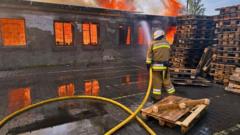Recent reports indicate that Iranian President Masoud Pezeshkian was slightly injured during Israeli strikes on a secret facility in Tehran, amid ongoing military confrontations between Israel and Iran. The incident underscores the precarious security situation in the region, leading to intense scrutiny of intelligence operations conducted by Israel and the Iranian leadership's response.
Iranian President Injured in Israeli Strikes: A Closer Look at the Ongoing Conflict

Iranian President Injured in Israeli Strikes: A Closer Look at the Ongoing Conflict
The reported injury of Iranian President Masoud Pezeshkian in an Israeli attack has raised tensions as both nations grapple with escalating hostilities.
Iranian President Masoud Pezeshkian reportedly sustained minor injuries during an Israeli airstrike on a covert facility in Tehran last month. According to Iran's state-affiliated news agency, Fars, the incident occurred on June 16, when several bombs targeted the entrance and exit routes of a secure location where Pezeshkian was engaged in discussions with the Supreme National Security Council.
As the story unfolds, Fars claims that Pezeshkian and his colleagues escaped through an emergency exit. The Emerging reports suggest Iranian officials are investigating possible Israeli infiltration efforts, although Fars' assertions remain unverified by independent sources. Israel has yet to issue a statement concerning these allegations.
During a period of intense conflict, videos posted on social media depicted Israeli strikes in north-western Tehran, hinting at a coordinated effort to target significant military installations. It has emerged that on the fourth day of the hostilities, a secret underground facility housing Iran's leading figures was struck, with the report indicating that all entrances, exits, and ventilation systems were damaged.
Pezeshkian’s injury coincided with a tumultuous period for Iran's leadership, particularly following the surprise assault on June 13 that Israel claims aimed at hindering Iran's potential nuclear weapons program. Iranian officials, while denying any intent to develop such weapons, retaliated with aerial strikes against Israel.
In a prior statement, Pezeshkian accused Israel of attempting to assassinate him, a claim dismissed by Israeli officials. Further complicating the narrative, reports suggest that earlier strikes resulted in the loss of numerous top Iranian Revolutionary Guard Corps (IRGC) commanders. The abruptness of these assaults caught Iranian leaders off guard, leading to a breakdown in strategic decision-making during the initial hours of the confrontation.
The conflict has highlighted significant intelligence capabilities on the part of Israel in locating Iranian command structures, raising questions about the nature and extent of Israeli surveillance on Iranian operations. Following the attacks, the U.S. Air Force and Navy also targeted Iranian nuclear sites on June 22, further illustrating the broader international implications of escalating tensions in the region.





















